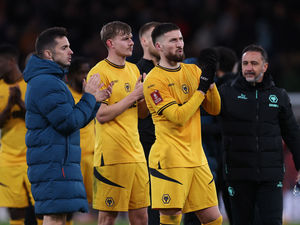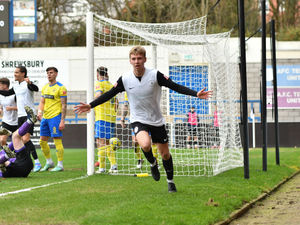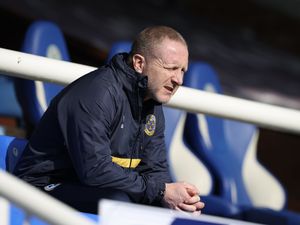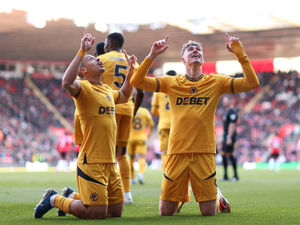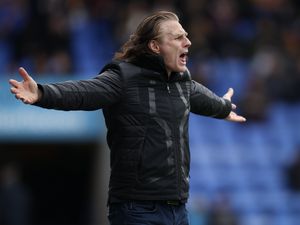Big Interview: Gabby Logan masters presenting
Over the past 15 years, Gabby Logan has turned into a mainstay of British sports coverage.
Regardless of which sport you follow, at some point this year you will probably have been comforted by her professional yet warm presenting style and interview technique.
Whether she’s probing England boss Gareth Southgate with thoughtful questions in Russia, presenting the coverage of the Six Nations, or fronting an all-female team for the European Championships, Logan is a safe pair of hands regardless of the discipline on show.
So who better to help present and promote the wrap-up of the sporting year next month?
Logan’s prodigious body of work extends to the BBC Sports Personality of the Year awards, which she has helped present for the past five years.
This year, it is returning to Birmingham and for the first time, the nominees will not be revealed until the night of the awards at the Genting Arena on Sunday, December 16.
Instead of the usual dozen, viewers will be asked to pick their favourite from a shortlist of six.
Thanks to modern technology, the way we consume sport is evolving rapidly. In this age of social media, immediacy is king, and Logan believes this is the best way to engage with an audience used to voting on smartphones.
“We are not arrogant enough to assume after 65 years that it’s perfect,” she said. “We want to make it the best it can be. How is that possible? It’s an evolving show with a modern audience with different needs.
“We also want to celebrate the sporting year more than we previously have been able to.
“It’s always been a review of the year, but with a couple of months missing.
“Announcing a shorter list on the night will allow it.
“It’s more than just the summer, it’s a 12-month, 365 days a year performance, and we try and reflect that.”
This approach also cuts down the chance for social media campaigns. Last year, superbike world champion Jonathan Rea came second.
The year before, triathlete Alastair Brownlee was runner-up and equestrian’s Nick Skelton came third.
All three were well deserved, but it’s impossible to ignore the campaigns that drove them.
The new format, with fewer candidates, may not be so kind to minority sports.
“The minority sports will still be reflected,” insisted Logan. “We give a lot of coverage to sports that wouldn’t normally get that coverage.
“On the BBC we’ve had hours of gymnastics coverage, and diving coverage. We cover minority spots throughout the year, it’s not just box-ticking at Sports Personality of the Year.
“It’s part of our remit to make sure we do. The hours we put into the Commonwealth Games, or the European Championship, it’s 10 or 11 hours a day sometimes.
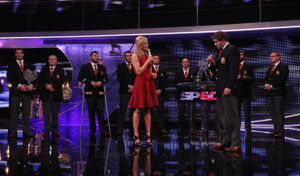
“It’s really important to shine a light on those sports. As someone who came from gymnastics, it’s so important you get a chance to see your heroes.
“If you can’t see it you can’t be it. It’s related to sponsorship and marketability and to thrive they do need coverage across all media outlets. But the BBC offers them that avenue regardless.”
A former gymnast herself, Logan was first inspired to take up the sport as a child while watching Olympic coverage of the sport on television.
“I remember the 1984 Los Angeles Olympics really well,” she recalled. “It sucked me into the sport.
“I was only 11 and I watched every single minute and recorded all of the rhythmic gymnastics.
“I watched their routines. There was a boycott from some of the European countries but I was mesmerised by the Romanian gymnasts.
“I had a tape that was worn out I watched it so much so I can tap into that excitement.”
Logan’s passion for sport, all sport, is what comes across so vividly in both her presenting and this interview.
This year has been one of the most enjoyable ones of her career.
“I’ve worked on some incredible events from the Commonwealth Games, where netball had a great moment, to the World Cup in Russia, which was a joy to be part of,” she said. “The set-up around England was unique, this positive go-getting team hugely orchestrated by Gareth (Southgate).
“It was a unique experience for me having gone to tournaments with England five times.
“It totally surprised people, and it was joyous, that’s how Russia left me feeling.
“There was also the European Championships, seeing Dina Asher Smith was wonderful and then back to the team stuff with the Ryder Cup.
“For me the importance of the show is that people do care. It’s a democracy, a chance to wield your vote, and vote for who you believe in.
“You have people who don’t know too much about back stories, then on the night they can resonate and it allows us to show a decent side of these people.
“I feel personally, if you can help somebody to give a good account of themselves that is the key for me.”
The summer was dominated by England’s exploits in Russia under Southgate, but Logan doesn’t believe that World Cup semi-final squad will necessarily dominate the night in December.
Lewis Hamilton has won his fifth Formula One championship, and only athletics has more Sports Personality of the Year winners than F1.
Speaking of athletics, Dina Asher-Smith’s triple-gold at the European Championships makes her a strong contender, while unified heavyweight champion Anthony Joshua has won two big fights this year.
“There is no dominant sport,” said Logan. “It’s the whole pantheon of sporting excellence, whether it’s Olympic Games, World Cup, Open winners.
“It’s very much a reflection of the whole sporting year and that’s what the whole point is.”
Sports Personality of the Year has been derided in some quarters for being an outdated idea – but Logan doesn’t have time for the dissenters and the moaners.
She argues that a lot of people who question the eventual three winners, don’t often have a leg to stand on.
“When I did Strictly (Come Dancing), people always came up to me and said ‘I can’t believe you went out, you were brilliant!’
“I said ‘did you vote?’ and they always said ‘no’!”
Just like Strictly, Sports Personality of the Year is quite a quirky British tradition. But Logan believes that uniqueness is what makes it so interesting.
“It’s about cementing your name in a very important list of names in history,” she said. “People debate it long and hard before and after, people do care.
“There are only 65 names on that trophy. As Steve Redgrave said, ‘I’ve got five Olympic gold medals, but only one of these’.”

